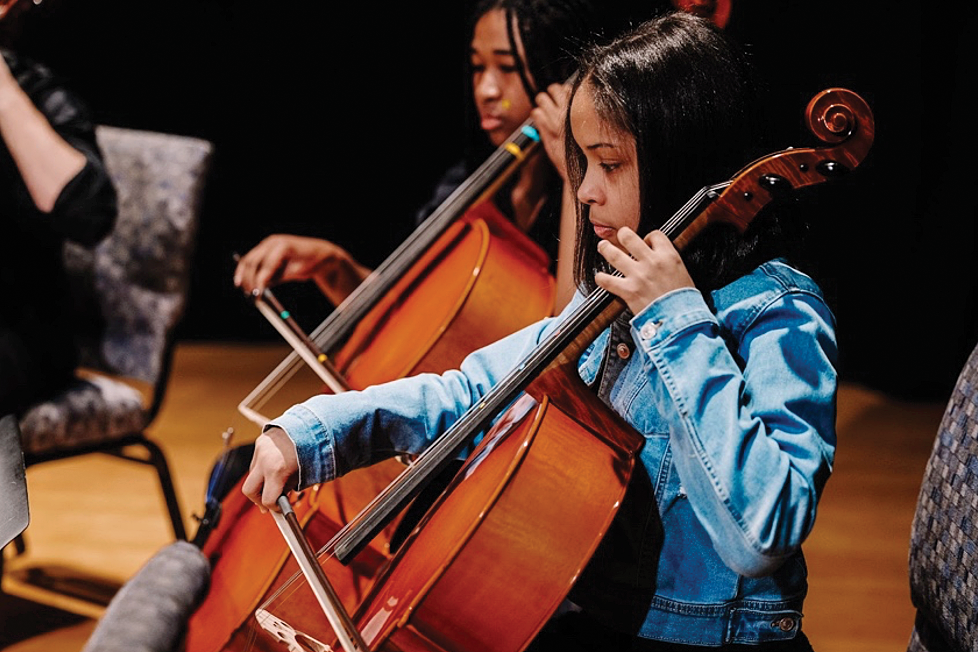April 17, 2024

Conservatory Lab student playing the cello during a school concert.
Can music class help curb absenteeism in city schools? The answer, according to a recent study and anecdotal evidence from one public charter school in Dorchester, is “yes.”
The survey, conducted by EdVestors, an organization promoting “equitable, meaningful education,” examined the influence of arts education within the Boston Public Schools (BPS) system between 2011-2019 and found that over a full school year, each student enrolled in an arts course saw an increase of a third of a day in attendance, translating to 9 additional days of instruction for a classroom of 25 students.
Ruth Mercado-Zizzo, vice-president of Programs and Equity at EdVestors, told the Reporter in an interview that researchers analyzed arts access and absenteeism data to determine their correlation, utilizing a sample size of more than 300,000 individuals over that 11-year period. She asserted that incorporating art into education yields positive impacts on emotional and youth development outcomes.
“Access to art increases a positive school climate and also creates a sense of community, where more families and parents will feel more engaged in the school community,” she said.

Conservatory Lab students playing the cello during a school concert.
Vanessa Lee photos
Conservatory Lab, a K-8 school on Columbia Road, incorporates music class into each school day as a tool for learning. EdVestors points to it as a prime example of how arts can lead to better outcomes that reduce absentee rates, which have spiked since the pandemic.
Not only did Conservatory Lab show improvements in attendance rates, but the school also experienced an increase in overall academic achievement. The state designated the Conservatory Lab as a school of recognition – the only school in Massachusetts so named – due to the growth it saw from students’ Massachusetts Comprehensive Assessment System (MCAS) scores.
“I think the opportunity for students to concretely see themselves improving with music helps [with attendance],” said Nicole Mack, executive director of the charter school. “The students get really excited about opportunities to showcase their skills, and that’s a daily part of their day.” Being physically present in school naturally contributes to academic success, she noted.
Abigail Kelling, a grade 8 humanities teacher at Conservatory Lab, said that her students are passionate about music at school. Among the 8th graders, she said, more than half of the students applied to go to Boston Arts Academy for high school this year.
“It definitely feels like part of what kids want to take away and like to continue doing,” she added.
Additionally, she said, music teachers at the school are good at building projects that are interdisciplinary with academic subjects. In the past, a strings teacher did a whole unit of Afrofuturism that Kelling was able to build from with students in the science fiction English unit.
Macaulley Whitlock, a music and strings teacher for pre-K through 8th grade, noted that students become “really excited to bring their instruments home to practice,” which, he added, in turn motivates them to return to school eager to engage in musical activities with their peers and learn new concepts, consequently leading to improved attendance rates overall.
Brendan Dieck, a fifth-grade humanities teacher, believes that music gives students a boost in confidence, especially for those who struggle with academics.
“It gives them the little push they need to persevere in classes they may find more challenging,’ he said.
Conservatory Lab hopes to showcase more performances for students to display their musical skills. “Performances are very motivating to students and to families. You can’t help but feel proud,” said Mack.
For her part, Mercado-Zizzo suggests that if other schools are considering using arts as a strategy for school improvement, they should “definitely look into hiring certified teachers and partnering with arts organizations or communities in their neighborhood” for expertise.


